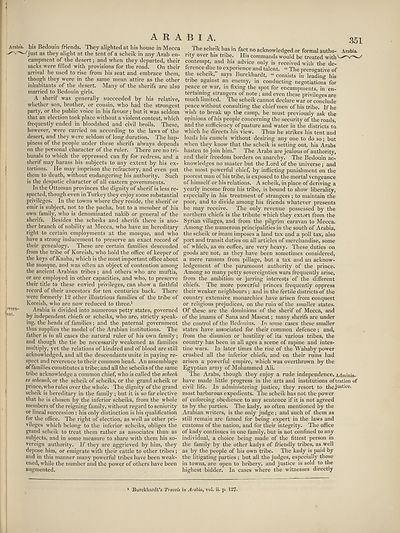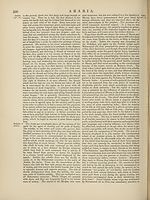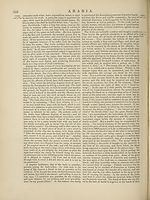Encyclopaedia Britannica > Volume 3, Anatomy-Astronomy
(359) Page 351
Download files
Complete book:
Individual page:
Thumbnail gallery: Grid view | List view

4
ARABIA.
351
Arabia, his Bedouin friends. They alighted at his house in Mecca
^^just as they alight at the tent of a scheik in any Arab en¬
campment of the desert; and when they departed, their
sacks were filled with provisions for the road. On their
arrival he used to rise from his seat and embrace them,
though they were in the same mean attire as the other
inhabitants of the desert. Many of the sherifs are also
married to Bedouin girls.
A sherif was generally succeeded by his relative,
whether son, brother, or cousin, who had the strongest
party, or the public voice in his favour ; but it was seldom
that an election took place without a violent contest, which
frequently ended in bloodshed and civil broils. These,
however, were carried on according to the laws of the
desert, and they were seldom of long duration. The hap¬
piness of the people under these sherifs always depends
on the personal character of the ruler. There are no tri¬
bunals to which the oppressed can fly for redress, and a
sherif may harass his subjects to any extent by his ex¬
tortions. He may imprison the refractory, and even put
them to death, without endangering his authority. Such
is the despotic character of all eastern governments.
In the Ottoman provinces the dignity of sherif is less re¬
spected, though even in Turkey they enjoy some substantial
privileges. In the towns where they reside, the sherif or
emir is subject, not to the pacha, but to a member of his
own family, who is denominated nakib or general of the
sherifs. Besides the scheiks and sherifs there is ano¬
ther branch of nobility at Mecca, who have an hereditary
right to certain employments at the mosque, and who
have a strong inducement to preserve an exact record of
their genealogy. These are certain families descended
from the tribe of Koreish, who hold the office of keeper of
the keys of Kaaba, which is the most important office about
the mosque, and was often an object of contention among
the ancient Arabian tribes; and others who are muftis,
or are employed in other capacities, and who, to preserve
their title to these envied privileges, can show a faithful
record of their ancestors for ten centuries back. There
were formerly 12 other illustrious families of the tribe of
Koreish, who are now reduced to three.1
vorn- Arabia is divided into numerous petty states, governed
by independent chiefs or scheiks, who are, strictly speak¬
ing, the heads of families; and the paternal government
thus supplies the model of the Arabian institutions. The
lather is in all cases the natural ruler of his own family;
and though the tie be necessarily weakened as families
multiply, yet the relations of kindred and of blood are still
acknowledged, and all the descendants unite in paying re¬
spect and reverence to their common head. An assemblage
of families constitutes a tribe; and all the scheiks of the same
tribe acknowledge a common chief, who is called the schech
es scheuch, or the scheik of scheiks, or the grand scheik or
prince, who rules over the whole. The dignity of the grand
scheik is hereditary in the family ; but it is so far elective
that he is chosen by the inferior scheiks, from the whole
members of the reigning family, without regard to seniority
or lineal succession : his only distinction is his qualification
for the office. The right of election, as well as other pri¬
vileges which belong to the inferior scheiks, obliges the
grand scheik to treat them rather as associates than as
subjects, and in some measure to share with them his so¬
vereign authority. If they are aggrieved by him, they
depose him, or emigrate with their cattle to other tribes;
and in this manner many powerful tribes have been weak¬
ened, while the number and the power of others have been
augmented.
The scheik has in fact no acknowledged or formal autho- Arabia,
nty over his tribe. His commands would be treated with
contempt, and his advice only is received with the de¬
ference due to experience and talent. “ The prerogative of
the scheik, says Burckhardt, “ consists in leading his
tribe against an enemy, in conducting negotiations for
peace or war, in fixing the spot for encampments, in en-
teitaining strangers of note ; and even these privileges are
much limited. The scheik cannot declare war or conclude
peace without consulting the chief men of his tribe. If he
wish to break up the camp, he must previously ask the
opinions of his people concerning the security of the roads,
and the sufficiency of pasture and water in the districts to
which he directs his view. Thus he strikes his tent and
loads his camels without desiring any one to do so; but
when they know that the scheik is setting out, his Arabs
hasten to join him.” The Arabs are jealous of authority,
and their freedom borders on anarchy. The Bedouin ac¬
knowledges no master but the Lord of the universe ; and
the most powerful chief, by inflicting punishment on the
poorest man of his tribe, is exposed to the mortal vengeance
of himself or his relations. A scheik, in place of deriving a
yearly income from his tribe, is bound to show liberality,
especially in his treatment of strangers ; to maintain the
poor, and to divide among his friends whatever presents
be may receive. The only revenue possessed by the
northern chiefs is the tribute which they extort from the
Syrian villages, and from the pilgrim caravan to Mecca.
Among the numerous principalities in the south of Arabia,
the scheik or imam imposes a land tax and a poll tax, also
port and transit duties on all articles of merchandise, some
of which, as on coffee, are very heavy. These duties on
goods are not, as they have been sometimes considered,
a mere ransom from pillage, but a tax and an acknow¬
ledgement of the paramount authority of the prince.
Among so many petty sovereignties wars frequently arise,
from the ambition or jarring interests of the different
chiefs. The more powerful princes frequently oppress
their weaker neighbours; and in the fertile districts of the
country extensive monarchies have arisen from conquest
or religious prejudices, on the ruin of the smaller states.
Of these are the dominions of the sherif of Mecca, and
of the imams of Sana and Mascat; many sherifs are under
the control of the Bedouins. In some cases these smaller
states have associated for their common defence; and,
from the disunion or hostility of its various tribes, the
country has been in all ages a scene of rapine and intes¬
tine wars. In later times the rise of the Wahaby power
crushed all the inferior chiefs, and on their ruins had
arisen a powerful empire, which was overthrown by the
Egyptian army of Mohammed Ali.
The Arabs, though they enjoy a rude independence, Adminis-
have made little progress in the arts and institutions oftration of
civil life. In administering justice, they resort to thejustice-
most barbarous expedients. The scheik has not the power
of enforcing obedience to any sentence if it is not agreed
to by the parties. The kady, so often mentioned by the
Arabian writers, is the only judge; and such of them as
still remain are famed for being expert in the laws and
customs of the nation, and for their integrity. The office
of kady continues in one family, but is not confined to any
individual, a choice being made of the fittest person in
the family by the other kadys of friendly tribes, as well
as by the people of his own tribe. The kady is paid by
the litigating parties ; but all the judges, especially those
in towns, are open to bribery, and justice is sold to the
highest bidder. In cases where the witnesses directly
1 Burckhardt’s Travels in Arabia, vol. ii. p. 12J.
ARABIA.
351
Arabia, his Bedouin friends. They alighted at his house in Mecca
^^just as they alight at the tent of a scheik in any Arab en¬
campment of the desert; and when they departed, their
sacks were filled with provisions for the road. On their
arrival he used to rise from his seat and embrace them,
though they were in the same mean attire as the other
inhabitants of the desert. Many of the sherifs are also
married to Bedouin girls.
A sherif was generally succeeded by his relative,
whether son, brother, or cousin, who had the strongest
party, or the public voice in his favour ; but it was seldom
that an election took place without a violent contest, which
frequently ended in bloodshed and civil broils. These,
however, were carried on according to the laws of the
desert, and they were seldom of long duration. The hap¬
piness of the people under these sherifs always depends
on the personal character of the ruler. There are no tri¬
bunals to which the oppressed can fly for redress, and a
sherif may harass his subjects to any extent by his ex¬
tortions. He may imprison the refractory, and even put
them to death, without endangering his authority. Such
is the despotic character of all eastern governments.
In the Ottoman provinces the dignity of sherif is less re¬
spected, though even in Turkey they enjoy some substantial
privileges. In the towns where they reside, the sherif or
emir is subject, not to the pacha, but to a member of his
own family, who is denominated nakib or general of the
sherifs. Besides the scheiks and sherifs there is ano¬
ther branch of nobility at Mecca, who have an hereditary
right to certain employments at the mosque, and who
have a strong inducement to preserve an exact record of
their genealogy. These are certain families descended
from the tribe of Koreish, who hold the office of keeper of
the keys of Kaaba, which is the most important office about
the mosque, and was often an object of contention among
the ancient Arabian tribes; and others who are muftis,
or are employed in other capacities, and who, to preserve
their title to these envied privileges, can show a faithful
record of their ancestors for ten centuries back. There
were formerly 12 other illustrious families of the tribe of
Koreish, who are now reduced to three.1
vorn- Arabia is divided into numerous petty states, governed
by independent chiefs or scheiks, who are, strictly speak¬
ing, the heads of families; and the paternal government
thus supplies the model of the Arabian institutions. The
lather is in all cases the natural ruler of his own family;
and though the tie be necessarily weakened as families
multiply, yet the relations of kindred and of blood are still
acknowledged, and all the descendants unite in paying re¬
spect and reverence to their common head. An assemblage
of families constitutes a tribe; and all the scheiks of the same
tribe acknowledge a common chief, who is called the schech
es scheuch, or the scheik of scheiks, or the grand scheik or
prince, who rules over the whole. The dignity of the grand
scheik is hereditary in the family ; but it is so far elective
that he is chosen by the inferior scheiks, from the whole
members of the reigning family, without regard to seniority
or lineal succession : his only distinction is his qualification
for the office. The right of election, as well as other pri¬
vileges which belong to the inferior scheiks, obliges the
grand scheik to treat them rather as associates than as
subjects, and in some measure to share with them his so¬
vereign authority. If they are aggrieved by him, they
depose him, or emigrate with their cattle to other tribes;
and in this manner many powerful tribes have been weak¬
ened, while the number and the power of others have been
augmented.
The scheik has in fact no acknowledged or formal autho- Arabia,
nty over his tribe. His commands would be treated with
contempt, and his advice only is received with the de¬
ference due to experience and talent. “ The prerogative of
the scheik, says Burckhardt, “ consists in leading his
tribe against an enemy, in conducting negotiations for
peace or war, in fixing the spot for encampments, in en-
teitaining strangers of note ; and even these privileges are
much limited. The scheik cannot declare war or conclude
peace without consulting the chief men of his tribe. If he
wish to break up the camp, he must previously ask the
opinions of his people concerning the security of the roads,
and the sufficiency of pasture and water in the districts to
which he directs his view. Thus he strikes his tent and
loads his camels without desiring any one to do so; but
when they know that the scheik is setting out, his Arabs
hasten to join him.” The Arabs are jealous of authority,
and their freedom borders on anarchy. The Bedouin ac¬
knowledges no master but the Lord of the universe ; and
the most powerful chief, by inflicting punishment on the
poorest man of his tribe, is exposed to the mortal vengeance
of himself or his relations. A scheik, in place of deriving a
yearly income from his tribe, is bound to show liberality,
especially in his treatment of strangers ; to maintain the
poor, and to divide among his friends whatever presents
be may receive. The only revenue possessed by the
northern chiefs is the tribute which they extort from the
Syrian villages, and from the pilgrim caravan to Mecca.
Among the numerous principalities in the south of Arabia,
the scheik or imam imposes a land tax and a poll tax, also
port and transit duties on all articles of merchandise, some
of which, as on coffee, are very heavy. These duties on
goods are not, as they have been sometimes considered,
a mere ransom from pillage, but a tax and an acknow¬
ledgement of the paramount authority of the prince.
Among so many petty sovereignties wars frequently arise,
from the ambition or jarring interests of the different
chiefs. The more powerful princes frequently oppress
their weaker neighbours; and in the fertile districts of the
country extensive monarchies have arisen from conquest
or religious prejudices, on the ruin of the smaller states.
Of these are the dominions of the sherif of Mecca, and
of the imams of Sana and Mascat; many sherifs are under
the control of the Bedouins. In some cases these smaller
states have associated for their common defence; and,
from the disunion or hostility of its various tribes, the
country has been in all ages a scene of rapine and intes¬
tine wars. In later times the rise of the Wahaby power
crushed all the inferior chiefs, and on their ruins had
arisen a powerful empire, which was overthrown by the
Egyptian army of Mohammed Ali.
The Arabs, though they enjoy a rude independence, Adminis-
have made little progress in the arts and institutions oftration of
civil life. In administering justice, they resort to thejustice-
most barbarous expedients. The scheik has not the power
of enforcing obedience to any sentence if it is not agreed
to by the parties. The kady, so often mentioned by the
Arabian writers, is the only judge; and such of them as
still remain are famed for being expert in the laws and
customs of the nation, and for their integrity. The office
of kady continues in one family, but is not confined to any
individual, a choice being made of the fittest person in
the family by the other kadys of friendly tribes, as well
as by the people of his own tribe. The kady is paid by
the litigating parties ; but all the judges, especially those
in towns, are open to bribery, and justice is sold to the
highest bidder. In cases where the witnesses directly
1 Burckhardt’s Travels in Arabia, vol. ii. p. 12J.
Set display mode to:
![]() Universal Viewer |
Universal Viewer | ![]() Mirador |
Large image | Transcription
Mirador |
Large image | Transcription
Images and transcriptions on this page, including medium image downloads, may be used under the Creative Commons Attribution 4.0 International Licence unless otherwise stated. ![]()
| Encyclopaedia Britannica > Encyclopaedia Britannica > Volume 3, Anatomy-Astronomy > (359) Page 351 |
|---|
| Permanent URL | https://digital.nls.uk/193762015 |
|---|
| Attribution and copyright: |
|
|---|---|
| Shelfmark | EB.16 |
|---|---|
| Description | Ten editions of 'Encyclopaedia Britannica', issued from 1768-1903, in 231 volumes. Originally issued in 100 weekly parts (3 volumes) between 1768 and 1771 by publishers: Colin Macfarquhar and Andrew Bell (Edinburgh); editor: William Smellie: engraver: Andrew Bell. Expanded editions in the 19th century featured more volumes and contributions from leading experts in their fields. Managed and published in Edinburgh up to the 9th edition (25 volumes, from 1875-1889); the 10th edition (1902-1903) re-issued the 9th edition, with 11 supplementary volumes. |
|---|---|
| Additional NLS resources: |
|

